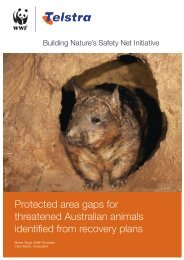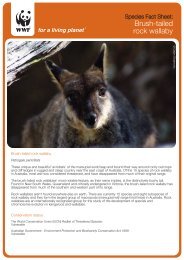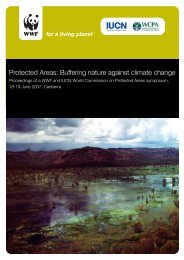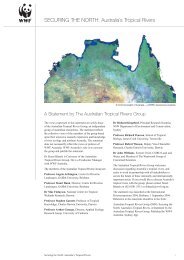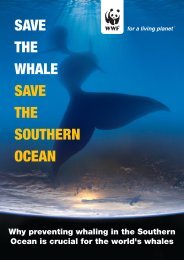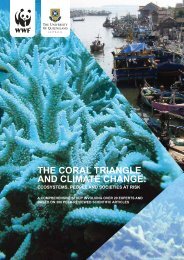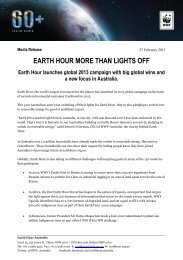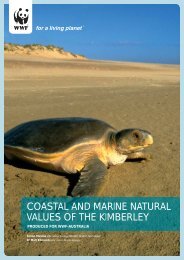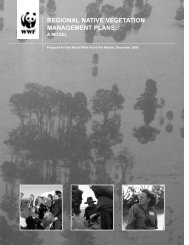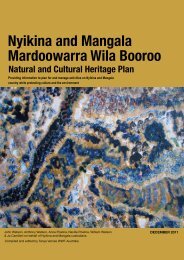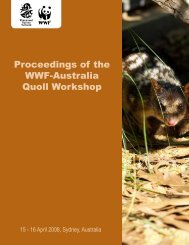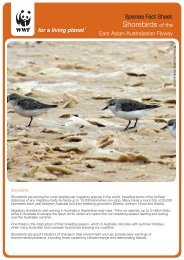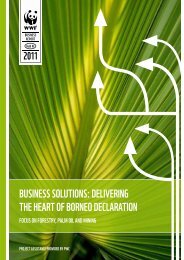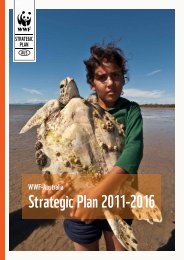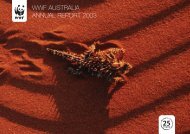Indigenous Peoples and Conservation Organizations
Indigenous Peoples and Conservation Organizations
Indigenous Peoples and Conservation Organizations
Create successful ePaper yourself
Turn your PDF publications into a flip-book with our unique Google optimized e-Paper software.
The Xavante in Central Brazil 65<br />
First, the idea resonated powerfully within the<br />
community <strong>and</strong> was rooted in community experience<br />
<strong>and</strong> expertise. And second, there was no<br />
rush to implement a plan by importing an elaborate<br />
theoretical framework or building physical<br />
infrastructure that no one knew how to operate.<br />
The project began with a period of joint research<br />
that over time allowed WWF to better underst<strong>and</strong><br />
its partner as well as what had to be done. The<br />
fruit-processing effort rushed to open a factory<br />
<strong>and</strong> never gave funders the opportunity to meet<br />
the community firsth<strong>and</strong>.<br />
Rather than imposing an outside agenda, the<br />
wildlife project respected <strong>and</strong> tried to build on<br />
the foundation of the Xavante’s knowledge of<br />
natural resource management. In doing so, it<br />
reinforced the cultural recovery that was under<br />
way <strong>and</strong> stirred thinking about what was at stake.<br />
The danger was not simply that wildlife would<br />
vanish, but that an important dimension of<br />
Xavante identity would perish with it. This was<br />
reflected in elders’ growing fear that youth were<br />
uninformed <strong>and</strong> uninterested, <strong>and</strong> that essential<br />
knowledge was being lost. Now there are animated<br />
discussions about the habits of various<br />
animals <strong>and</strong> how they are to be hunted. This<br />
process has also inverted the conventional wisdom<br />
that hunting cultures are dysfunctional<br />
under environmental stress. In realizing how<br />
close they are to the animals they hunt, the<br />
Xavante have found a powerful cultural reason to<br />
sustain the resource <strong>and</strong> the motivation to find<br />
the means for doing so.<br />
Thus, Xavante involvement in project data collection<br />
<strong>and</strong> decision making has been very productive.<br />
The Xavante have begun to underst<strong>and</strong><br />
how their lifestyle changes have affected the territory<br />
around them. There is greater recognition<br />
of the reserve’s unique resources, <strong>and</strong> protecting<br />
them has become a priority.<br />
A number of secondary benefits unrelated to<br />
wildlife management or natural resource conservation<br />
also have been achieved. The first sustained<br />
collaboration between the community <strong>and</strong><br />
an NGO has helped the Xavante gain important<br />
skills that are essential to their ability to manage<br />
future dealings with outside entities. These<br />
skills, which can be thought of as the social<br />
infrastructure for any kind of project success,<br />
include such things as how to negotiate with<br />
NGO representatives, devise project ideas <strong>and</strong><br />
write grant proposals, prepare progress reports,<br />
keep accounting records, <strong>and</strong> gain management<br />
experience. In founding the association <strong>and</strong><br />
learning how to make it work, they have been<br />
doing nothing less than inventing a new kind of<br />
social tool for themselves.<br />
Yet anyone who presumes that there is some<br />
magic formula for working with indigenous peoples<br />
only needs to look at the problems that surfaced<br />
<strong>and</strong> at times threatened to undermine the<br />
collaboration. Many of these were unavoidable<br />
since they were deeply embedded in the culture<br />
or a result of a long <strong>and</strong> troubled history with<br />
outsiders. The point is not that all collaborations<br />
will face these particular obstacles, but that a<br />
clear underst<strong>and</strong>ing of the cultural matrix in<br />
each project is vital to its success. A better<br />
underst<strong>and</strong>ing of the factional nature of Xavante<br />
society <strong>and</strong> of the complexity of forming transparent<br />
partnerships might have enabled WWF to<br />
anticipate <strong>and</strong> avoid some of the pitfalls that<br />
nearly swallowed the project.<br />
Not all problems, however, are what they seem.<br />
Some not only cannot be avoided, they must be<br />
welcomed. In this case, factionalism needs to be<br />
put into perspective. What would often be a sign<br />
of decay or disorganization in other societies is<br />
an indicator of cultural intactness among the<br />
Xavante. Posturing <strong>and</strong> politicizing are fundamental<br />
to Xavante social life, <strong>and</strong> individuals<br />
enjoy engaging in political disputes <strong>and</strong> displays.<br />
While politicization of nearly every imaginable<br />
aspect of the project may seem paralyzing to outsiders,<br />
it can also be interpreted as a sign of how<br />
deeply the Xavante are engaged, a sign that they<br />
are assuming project ownership on their own<br />
terms, at their own pace. Comparing the wildlife<br />
management experience with the failed fruit-processing<br />
component of Project Jaburu makes this<br />
more apparent. Fruit processing foundered quietly,<br />
without public acrimony, because the community<br />
had been excluded from decision making<br />
<strong>and</strong> had decided not to participate. The lack of<br />
“noise” in that case was a warning sign that<br />
things were not going well. In contrast, the current<br />
intercommunity factionalism may be a positive<br />
sign that the process of taking project<br />
ownership is extending beyond Etéñiritipa to<br />
other autonomous communities in the reserve.



